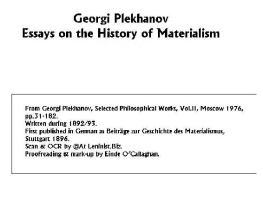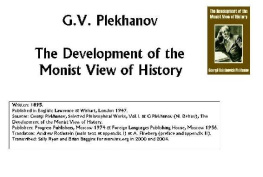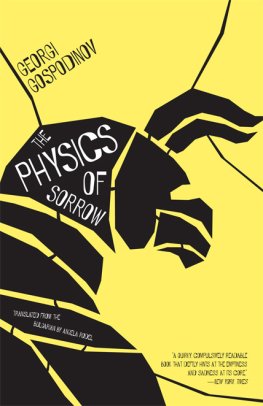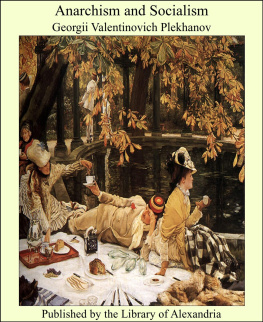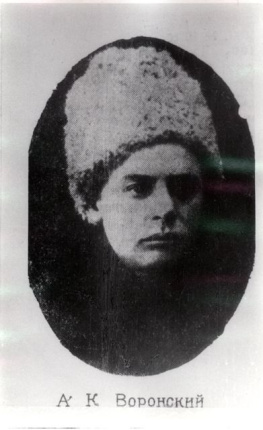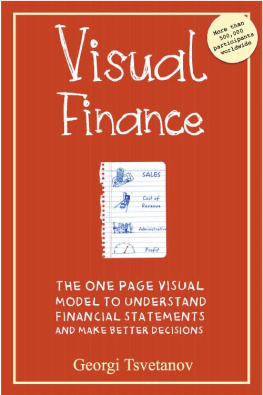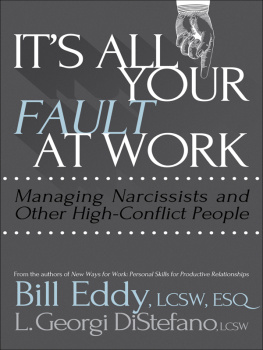Georgi Plekhanov - Essays on the History of Materialism - Plekhanov
Here you can read online Georgi Plekhanov - Essays on the History of Materialism - Plekhanov full text of the book (entire story) in english for free. Download pdf and epub, get meaning, cover and reviews about this ebook. genre: Science. Description of the work, (preface) as well as reviews are available. Best literature library LitArk.com created for fans of good reading and offers a wide selection of genres:
Romance novel
Science fiction
Adventure
Detective
Science
History
Home and family
Prose
Art
Politics
Computer
Non-fiction
Religion
Business
Children
Humor
Choose a favorite category and find really read worthwhile books. Enjoy immersion in the world of imagination, feel the emotions of the characters or learn something new for yourself, make an fascinating discovery.
- Book:Essays on the History of Materialism - Plekhanov
- Author:
- Genre:
- Rating:4 / 5
- Favourites:Add to favourites
- Your mark:
- 80
- 1
- 2
- 3
- 4
- 5
Essays on the History of Materialism - Plekhanov: summary, description and annotation
We offer to read an annotation, description, summary or preface (depends on what the author of the book "Essays on the History of Materialism - Plekhanov" wrote himself). If you haven't found the necessary information about the book — write in the comments, we will try to find it.
Essays on the History of Materialism - Plekhanov — read online for free the complete book (whole text) full work
Below is the text of the book, divided by pages. System saving the place of the last page read, allows you to conveniently read the book "Essays on the History of Materialism - Plekhanov" online for free, without having to search again every time where you left off. Put a bookmark, and you can go to the page where you finished reading at any time.
Font size:
Interval:
Bookmark:
.....................................................................
.......................................
Plekhanov envisaged his Essays as a series of articles for Neue Zeit, theoretical organ of the German Social-Democrats, already in 1892. The writing took him eighteen months, the work being completed towards the end of 1893.
In May 1893 Karl Kautsky, the editor of Neue Zeit, thanked Plekhanov for his article on Holbach; but two months later, on July 19, 1893, on receiving the article on Helvetius and expecting an article on Marx, Kautsky wrote a letter to Plekhanov in which he expressed his doubt as to the possibility of publishing these essays in Neue Zeit because they were too long; he suggested that they should be published as a separate book. Kautskys letter of January 27, 1894 testifies to his having received Plekhanovs last essay on Marx. The Essays were published then neither in Neue Zeit nor separately. Only in 1896 did they appear in book form in Stuttgart, under the title Beitrge zur Geschichte des Materialismus. I. Holbach. II. Helvetius. III. Marx. The Preface, written by Plekhanov especially for their publication, was signed: New Years Day, 1896. In 1903, a second German edition was put out by the same publishers. The book did not appear in Russian in Plekhanovs lifetime.
In the three essays I am submitting for appraisal by the German reader, I have attempted to interpret and expound Karl Marxs materialist understanding of history, which is one of the greatest achievements of nineteenth-century theoretical thought.
I am well aware that this is a very modest contribution: to provide convincing proof of all the value and all the significance of that understanding of history a full history of materialism would have to be written. Since I am not in a position to write that work, I have had to limit myself to a comparison, in several monographs, of eighteenth-century French materialism with todays.
Of all the representatives of French materialism, I have chosen Holbach and Helvetius, who, in my opinion, are in many respects outstanding thinkers who have not been duly appreciated to this day.
Helvetius has been impugned many a time; he has often been slandered, but few have gone to the trouble of trying to understand him. When I set about describing his writings and giving a critique of them, I had to turn virgin soil, if I may be permitted to use the expression. The only guidelines I could use were several cursory remarks I had come upon in the works of Hegel and Marx. It is not for rne to judge in what measure I have made proper use of what I have borrowed from these great teachers in the realm of philosophy.
Even in his lifetime, Holbach, who was less bold as a logician and less of a revolutionary thinker than Helvetius, shocked others far less than the author of De lEsprit ever did. He was not feared as much as the latter was; he was held in less disfavour, and got more fair play. Yet he, too, was only half-understood.
Like any other modern philosophical system, materialist philosophy has had to provide an explanation of two kinds of phenomena: on the one hand, Natures; on the other, those of mankinds historical development. The materialist philosophers of the eighteenth century at least, those who stood close to Locke had their own philosophy of history, in the same measure as they had a philosophy of Nature. To see that, one has only to read their writings with a modicum of attention. Therefore, the historians of philosophy should certainly set forth the French materialists ideas on history, and subject them to criticism just as they have done with their understanding of Nature. That task has not been accomplished however. Thus, for instance, when the historians of philosophy speak of Holbach, they usually give consideration only to his Systme de la Nature, in which work they investigate only whatever has a hearing on the philosophy of Nature, and morals. They ignore Holbachs historical views, which are scattered so plentifully throughout Systme de la Nature and his other works. There is nothing surprising, therefore, in the public at large having not the least idea of those views, and having an entirely incomplete and false impression of Hoibach. If one also takes into account thai the French materialists ethics has almost invariably been misinterpreted, it has to be acknowledged that very much in the history of eighteenth-century French materialism stands in need of amendment.
It should also he remembered that the approach we have mentioned is to be met, not only in general courses in Ihe history of philosophy hut also in specialist writings on the history of materialism (which, incidentally, are still few in number), examples being the classical work of Friedrich Albert Lange, in German, and a book by the Frenchman Jules-Auguste Soury.
As for Marx, it will suffice to say that neither the historians of philosophy in general nor the historians of materialism in particular have gone to the trouble or even making mention of his materialist understanding of history.
If a board is warped, the distortion can be rectified by bending it in the opposite direction. That is how I have been constrained to act in these Essays: I have had, first and foremost, to describe the historical views of the thinkers I am dealing with.
From the viewpoint of the school of thought I have the honour of belonging to, the ideal in nothing else than the material world, reflected by the human mind, and translated into forms of thought. Whoever wishes to regard the history of ideas from this point of view should try to explain how and in what manner the ideas of any period have been engendered by its social conditions, that is to say. ultimately by its economic relations. To provide such an explanation is a vast and noble task, whose accomplishment will utterly transform the history of ideologies. In these Essays, I have attempted an approach towards the accomplishment of that task. However. I have not been able to devote sufficient attention to it, and that, for a very simple reason: before answering the question why the development of ideas has proceeded in a definite way, one must first learn how that development has taken place. In respect of the subject of these Essays, that means that an explanation of why materialist philosophy developed in the way it did with Holbach and Helvetius in the eighteenth century, and with Marx in the nineteenth, is possible only after it is clearly shown what that philosophy was in reality which has been so often misunderstood and even quite distorted. The ground must be cleared before building can begin.
Another few words. The reader may find that I have dealt at insufficient length with these thinkers theory of cognition. To that I can object that I have done all I can to set forth their views in this respect with accuracy. However, since I do not number myself among the adherents of the theoretico-cognitive scholasticism that is in such vogue today, I have had no intention of dwelling on this absolutely secondary question.
Geneva, New Years Day, 1896
Friedrich Langes book Geschichte des Materialismus und Kritik seiner Bedeutung in der Gegenwart (History of Materialism and Criticism of Its Significance at the Present Time
Font size:
Interval:
Bookmark:
Similar books «Essays on the History of Materialism - Plekhanov»
Look at similar books to Essays on the History of Materialism - Plekhanov. We have selected literature similar in name and meaning in the hope of providing readers with more options to find new, interesting, not yet read works.
Discussion, reviews of the book Essays on the History of Materialism - Plekhanov and just readers' own opinions. Leave your comments, write what you think about the work, its meaning or the main characters. Specify what exactly you liked and what you didn't like, and why you think so.

